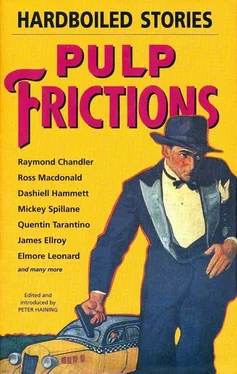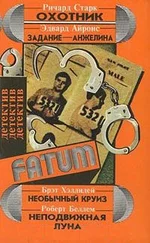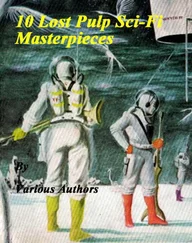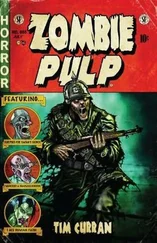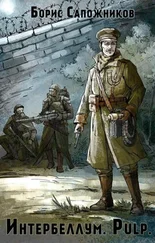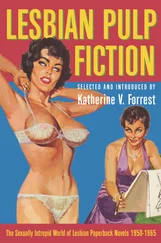‘I did time with him in South Portland,’ I said. I smiled at Sarge. ‘I liked him. He was dumb, but he was a good kid. He needed a keeper and it looked like I was elected. I didn’t mind. We were thinking about a bank in Lewiston. He couldn’t wait. So now he’s underground.’
‘Get me an onion,’ Sarge said.
I picked up the gun and showed him the muzzle, and for the first time he was the bird and it was the snake. ‘One more wisecrack and I’ll put a bullet in your belly. Do you believe that?’
His tongue flickered in and out with startling quickness, lizardlike, and he nodded his head. Keenan was frozen. He looked like he wanted to retch but didn’t quite dare.
‘He told me it was big time, enough to last him ten years. That’s all I could get. He took off on April third. Two days later four guys knock over the Portland-Bangor Brinks truck just outside of Carmel. All three guards dead. The newspapers said the robbers ran two roadblocks in a souped-up fifty-eight Ford. Barney had a fifty-eight Ford up on blocks, thinking about turning it into a stocker. I’m betting Keenan put up the front money for him to turn it into something a little better and a lot faster.’
I looked at them. No comment. Keenan’s face was the colour of cheese.
‘On May sixth I get a card postmarked Bar Harbor, but that doesn’t mean anything — there are dozens of little islands that channel their mail through there. A mailboat picks it up. The card says: “Mom and family fine, store doing good. See you in July.” It was signed with Barney’s middle name. I leased a cottage on the coast, because Barney knew that would be the deal. July comes and goes, no Barney.’
I looked at them remotely. ‘He showed up in early August. Courtesy of your buddy Keenan, Sarge. He forgot about the automatic bilge pump in the boat. You thought the chop would sink it quick enough, right, Keenan? But you thought he was dead, too. I had a yellow blanket spread out on Frenchman’s Point every day. Visible for miles. Easy to spot. Still, he was lucky. He couldn’t talk for long. You’d crossed him once already, right, Sarge? You didn’t tell him the money was new, all the serial numbers recorded. Not even one of the syndicate boys would dare buy it for ten, maybe fifteen years.’
‘That was for his own good,’ Sarge rumbled. ‘Ten years would make him thirty. Hell, I’ll be sixty-one.’
‘Did he buy Cappy MacFarland, too? Or was that just another surprise?’
‘We all had to buy Cappy,’ Sarge said. ‘He was a good man. A professional. He got cancer last year. Inoperable. And he owed me a favour.’
‘So the four of you went out to Cappy’s island,’ I said. ‘Cappy buried the money and made a map.’
‘It was Jagger’s idea,’ Sarge said. ‘We couldn’t hole up together for ten years. No one wanted to trust anyone else with knowing where the swag was — too much chance somebody’d go for the whole pie. And if we just split, somebody — your buddy, for instance — would get weak and spend some of it. If the cops put the arm on him, the guy might just cough up names. So we all went down to the beach for the afternoon. Cappy took care of it.’
‘Tell me about the map.’
‘I thought we’d get to that,’ Sarge said with a wintry smile.
‘Don’t tell him!’ Keenan cried out hoarsely. There was raw panic in his voice.
‘Shut up,’ Sarge said brutally. ‘He knows it all, thanks to you. If he doesn’t kill you, I will.’
‘Your name’s in a letter,’ Keenan said wildly, ‘if anything happens to me!’
‘Cappy drew it good,’ the Sarge said, as if Keenan were not there at all. ‘He had some draughtsman training in Joliet Penitentiary. He cut the map into quarters. One for each of us. We were going to have a reunion on July 4, 1982. But there was trouble.’
‘Yes,’ I agreed. My voice sounded remote.
‘If it makes you feel any better, it was Keenan’s play. Solo. Had to be. Jagger and I took off in Cappy’s boat. He was okay when we left.’
‘You’re a goddamn liar!’ Keenan squealed.
‘Who’s got two hunks of map in his wall safe?’ Sarge enquired. He looked at me again. ‘It was still all right. Two quarters still wasn’t enough. And maybe your buddy was better off out of the way. Three-way is better than four. Then Keenan called me. Gave me his address. Told me to come over and talk. Tonight. Of course, he had insurance. My name in an open-in-event-of-my-death letter that he’d sent his lawyer. His idea was that a two-way split would be even better than three. With three-quarters of the map, Keenan thought we might be able to dope it out.’
Keenan’s face was like a moon drifting somewhere in a high stratosphere of terror.
‘Where’s the safe?’ I asked him.
Keenan didn’t say anything.
I had done some practising with the .45. It was a good gun. I liked it. I held it in both hands and shot Keenan in the forearm, just below the elbow. The Sarge didn’t even jump. Keenan fell off the couch and curled up in a ball, holding his arm and screaming.
‘Where’s the safe?’ I asked him.
Keenan continued to scream.
‘I’ll shoot you in the knee,’ I said. ‘The Sarge can carry you to the safe.’
‘The print,’ he gasped. ‘The Van Gogh. Don’t shoot me any more, huh?’ He looked at me, grinning with pain and conciliation.
I motioned to Sarge with the gun. ‘Stand facing the wall.’
The Sarge got up and looked at the wall, arms dangling limply.
‘Now you,’ I said to Keenan. ‘Go open the safe.’
‘I’m bleeding to death,’ Keenan moaned.
I went over and stroked the butt of the .45 up the side of his cheek, laying back skin. ‘Now you’re bleeding,’ I told him. ‘Go open the safe or you’ll bleed more.’
Keenan got up, holding his arm and blubbering. He took the print off its hooks with his good hand, revealing an office-grey wall safe. He threw a terrified glance at me and began to twiddle the dial. He made two false starts and had to go back. The third time he got it open. There were some papers and two wads of bills inside. He reached in, fumbled around, and came up with two squares of paper, about three inches square.
I had meant to tie him up and leave him. He was harmless enough; he wouldn’t dare to come out of his house for a week. But it was like Sarge had said. He did have two.
And one of them had blood on it.
I shot him again, this time not in the arm. He went down like an empty laundry bag.
Sarge didn’t flinch. ‘I wasn’t crapping you. Keenan jobbed your friend. They were both amateurs. Amateurs are stupid.’
I didn’t answer. I looked down at the squares and shoved them into my pocket. Neither one had an X-marks-the-spot on it.
‘What now?’ Sarge asked.
‘We go to your place.’
‘What makes you think my piece is there?’
‘I don’t think you’d trust it any place else. But if it isn’t, we’ll go where it is.’
‘You’ve got all the answers, huh?’
‘Let’s go.’
We went back to the garage. I sat in the back of the VW, on the side away from him. The size of the car made a surprise play on his part almost impossible. It would take him five minutes to get turned around. Two minutes later we were on the road.
It was starting to snow, big, sloppy flakes that clung to the windscreen and turned to instant slush when they struck the pavement. It was slippery going, but there wasn’t much traffic.
After a half hour on Route 10, he turned off onto a secondary road. Fifteen minutes later we were on a rutted dirt track with snow-freighted pines staring at us on either side. Two miles along we turned into a short, trash-littered driveway.
In the limited sweep of the VW’s headlights I could make out a rickety backwoods shack with a patched roof and a twisted tv aerial. There was a snow-covered old Studebaker in a gully to the left. Out in back was an outhouse and a pile of old tyres. Welcome to the Park-Sheraton.
Читать дальше
